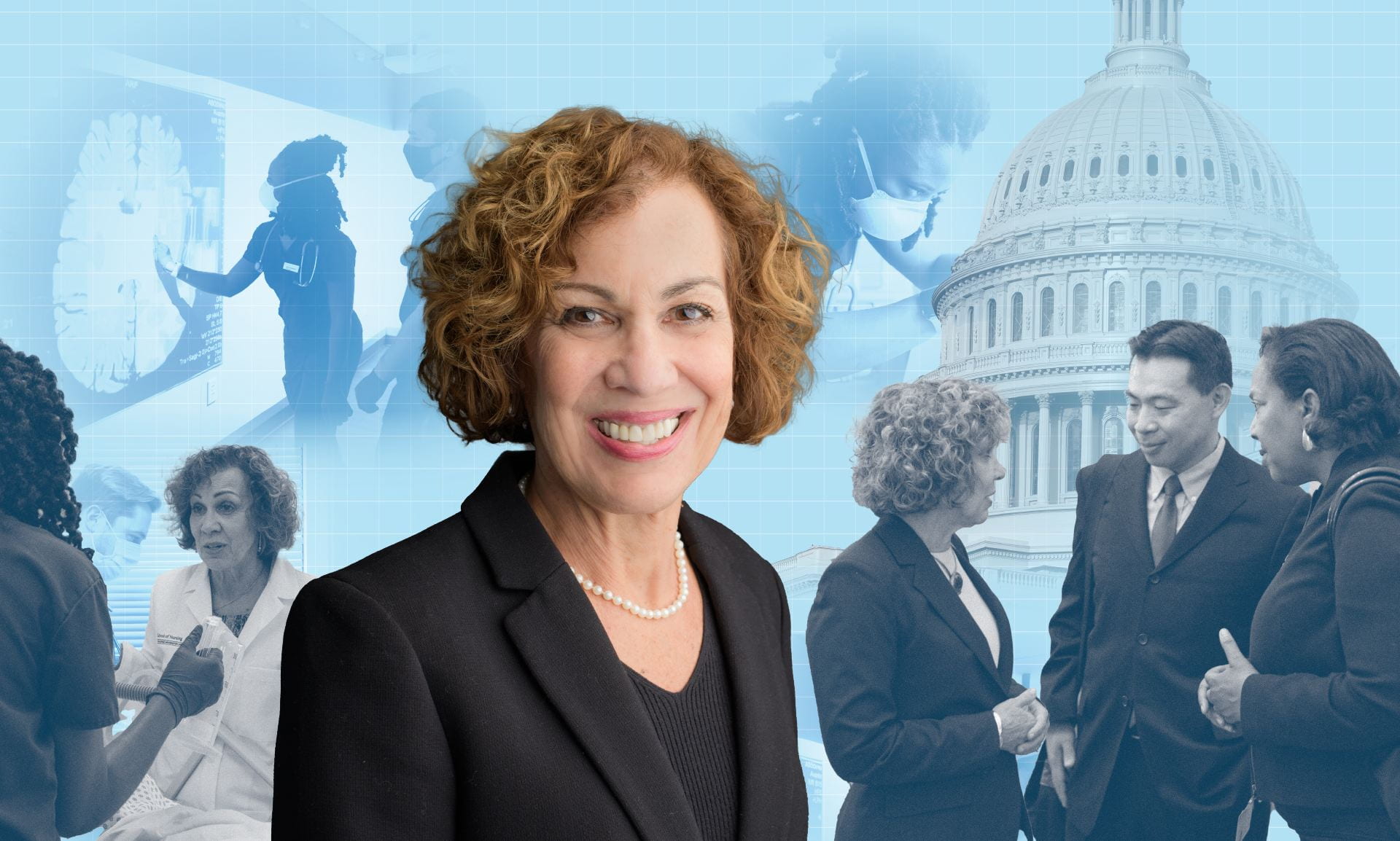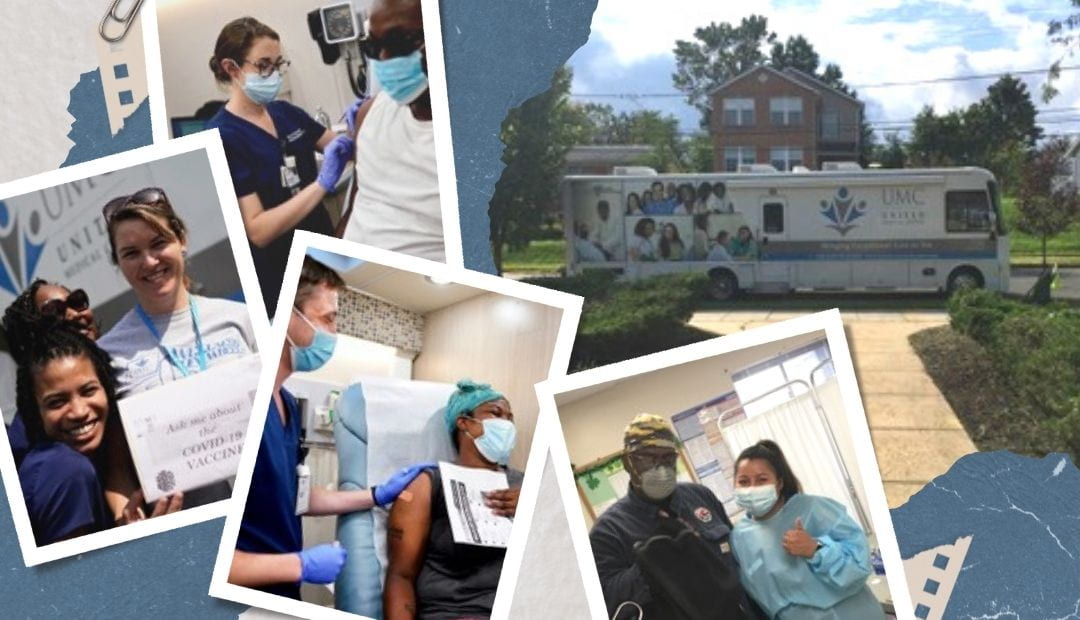For the past few years, GW Nursing Assistant Professor Erin Athey, D.N.P., FNP-BC, RN, FAANP has been working with United Medical Center (UMC) in Washington, D.C., running its mobile clinic program. Before COVID-19 struck, she partnered with the District of Columbia Housing Authority to provide primary and preventative care to people in Wards 7 and 8 public housing. The UMC mobile vans, out of which she operates the clinic, help to address health disparities and improve access to health care for the most underserved populations in D.C. These clinics also provide a unique and vital opportunity for GW Nursing students to get clinical hours and serve these communities.
COVID-19-era work
Once the COVID-19 pandemic hit in early 2020, the mobile clinic program received federal funds through the Coronavirus Aid, Relief, and Economic Security (CARES) Act to support its ongoing work and to equip it for the new challenges posed by COVID-19. By July 2020, the mobile clinic was going into the community two to three days each week. Dr. Athey and her students conducted extensive PCR COVID-19 testing during the summer and fall of 2020 while continuing to provide care such as HIV testing, general health care screenings, and referrals.
Beginning in 2021, once the COVID-19 vaccines received emergency use authorization, Dr. Athey used the vans as vaccination clinics, going to family properties throughout Wards 7 and 8. As was the case throughout much of the country, there was initially a huge demand for the vaccine, but in summer 2021, Dr. Athey and her team began to encounter fewer people willing to take the jab and more resistance to vaccination. This phenomenon is known as vaccine hesitancy.
According to Dr. Athey, the two main issues now leading to vaccine hesitancy and low vaccine uptake are access and trust. She said that even the complicated issue of misinformation can be broken down into having access to the facts and trusting the source enough to believe them. Overall, access issues can be greatly mitigated with the mobile clinic, which takes the shot directly to the people who might not have the time or means to get to the pharmacy. Trust, however, takes time to build. The strategy of the clinicians and students running the mobile van: Make connections, bring the facts, keep showing up. Dr. Athey said, “I do feel like it matters to go out, to show up… It’s not overnight that it’ll get fixed, but being there continuously over time makes a difference.”
Wards 7 and 8 have the lowest vaccine uptake of all of D.C., and given that these are primarily Black communities, this is a matter of health and racial equity. In D.C., Black people make up 56 percent of COVID-19 cases, 71 percent of deaths, and 46 percent of the total population, but they have received only 43 percent of vaccinations.i Continued vaccination efforts like those of the mobile clinic are crucial.
One unique way that Dr. Athey and her team have sought to reach new populations with the COVID-19 vaccine in recent months was the Beat the Streets program, a community outreach event in which they partnered with the Metropolitan Police Department. Outreach events like this allow Dr. Athey, the students, and other clinicians to talk to people in their own communities and help inspire confidence in vaccine safety, an approach that has been most successful with people who are still on the fence about the vaccine. With those who are firmly opposed to the vaccine, talking about its merits often has limitations. However, as vaccine mandates become more and more common among various employers—including the D.C. police, health care institutions, federal government, and many private businesses—there has been an influx of vaccine acceptance. Tapping into this, Dr. Athey and the mobile clinic team recently held a clinic downtown for restaurant employees as new mandates went into effect for their places of work.
The future of the clinic
The mobile clinic will continue to operate throughout the pandemic, providing testing and vaccinations, and building trust with the community. Dr. Athey hopes that the program will continue to grow. She is looking for grants, donors, and foundations to help fund the clinic’s care of the underserved communities in D.C. Furthermore, although UMC has not previously seen children, Dr. Athey is hopeful that the clinic can soon expand its services to include wellness exams, prevention, and vaccinations for kids. She also would like to expand the partnership with the D.C. Housing Authority and begin creating place-based clinics at some of the public housing properties. This would follow the cost-saving “minute clinic” model, utilizing nurse practitioners, nursing students, and resident navigators to continue to build trust and provide access to care.
GW Nursing is proud to be in partnership with Dr. Athey, UMC, the D.C. Housing Authority, and so many others who are working to advance health equity in our community. It is important for nurses and our GW Nursing community to be innovative and committed to equity, continuing to create new models of health care that build trust and increase engagement with disenfranchised communities. The mobile clinic is just one such model. As the most trusted health care professionals, nurses are in a unique position to lead this movement. Dream big and take action!
i. Nambi Ndugga, Latoya Hill, and Samantha Artiga. Latest Data on COVID-19 Vaccinations by Race/Ethnicity. September 2021. https://www.kff.org/coronavirus-covid-19/issue-brief/latest-data-on-covid-19-vaccinations-race-ethnicity/
AUTHOR Meredith Lidard Kleeman

